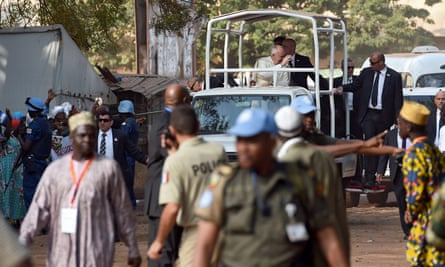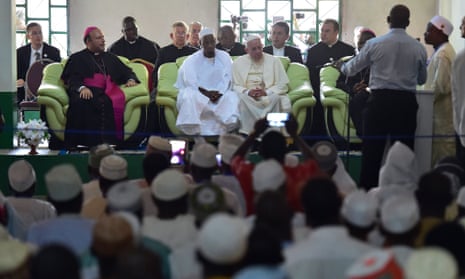Pope Francis has taken the biggest security risk of his papacy to visit a mosque under siege from armed Christian militias in Bangui, the capital of Central African Republic, delivering a message of peace and reconciliation in a show of solidarity.
Under heavy UN and Vatican protection, Francis travelled in his open popemobile into the heart of PK5, where 15,000 Muslims are surrounded by Christian militias. Before the civil war erupted in March 2013, the Muslim population of the capital was about 122,000 but most have fled. Thousands of people gathered at the roadside, cheering as the papal entourage drove down red dirt roads.
The 26-hour visit to Bangui was the first time the pope has visited an active war zone. CAR has been embroiled in civil war since President François Bozizé was ousted in a coup by Muslim rebels.

After removing his shoes on entering the Koudoukou mosque and bowing towards the holy Muslim city of Mecca, the pope told several hundred men inside that “Christians and Muslims are brothers and sisters”.
“Together, we must say no to hatred, to revenge and to violence, particularly that violence which is perpetrated in the name of a religion or of God himself. God is peace. Salaam,” he added, using the Arabic word for peace.
Francis said his visit to CAR “would not be complete if it did not include this encounter with the Muslim community”.
The chief imam at the mosque, Tidiani Moussa Naibi, thanked Francis for his visit, which he said was “a symbol which we all understand”.
Some Muslims are living in the mosque after being forced out of their homes by the violence. “We are very proud to welcome him. The pope is not only for the Christians, he is a servant of God for all Central Africans,” said Ibrahim Paulin, a spokesman for the displaced.
Armed UN peacekeepers were positioned on the mosque’s minarets and a helicopter hovered overhead. At the edge of the district, armed Muslim rebels stood in front of wooden barricades, watching for any threat from Christian vigilante groups.
The visit came towards the end of the pope’s six-day Africa tour, which included visits to Kenya and Uganda. After celebrating mass in a sports stadium, Francis departed for Rome.

A group of Muslim rebels joined thousands of people at the mass at the Barthelemy Boganda stadium. Two pickup trucks pulled up in the middle of the crowd shortly before the pope’s arrival and a group of Muslim vigilantes from PK5 leapt out, wearing T-shirts bearing the pope’s image, as people cheered and – referring to the conflict – shouted “it’s over”.
UN troops, Central African police, Vatican security and volunteer scouts patrolled outside and inside the 20,000-seat stadium. “I am happy to be doing this,” said David, a 20-year-old scout. “I feel that I am useful to the pope, that I am welcoming him personally to our country. It is important that he feels safe and welcome.”
Speaking in Italian, translated into the local language, Sango, the pope delivered a message of peace and unity. Central Africans should be “actors of change” for their country, he told the crowds. A large choir, mostly consisting of young women, sang during the two-hour mass.
Twelve-year-old Jesus Kopumo said his dream was to visit the mainly Muslim PK5 neighbourhood “to speak with our Muslim brothers and bring peace to the country, like the pope said”. He added: “All Central Africans believe in God and there is no difference between Muslims and Christians. So the bandits and armed groups must forget their weapons.” He hoped that “the criminals” had listened to the pope’s message.

The conflict in CAR is generally seen as a sectarian war between the Christian majority and Muslim minority. Thousands of people have been killed, about 1 million people displaced and property looted and destroyed. Alleged human rights violations have included extrajudicial killings, disappearances, torture and endemic rape and sexual violence.
The pope’s visit to Bangui was kept under constant review by Vatican security officials. While in CAR, Francis has been protected by some of the 12,000 UN peacekeepers stationed in the country, alongside Vatican security guards.
On Sunday, the pontiff called on fighting factions in CAR to lay down their weapons. Celebrating mass in Bangui, he said they should instead arm themselves “with justice, love, mercy and authentic peace”.
At a prayer vigil on Sunday evening, Francis called on the country’s young people to follow a “path of resistance” in the face of war, hate and division.
“To flee from challenges is never a solution. Resistance is needed. To have the courage of resistance and of fighting for good. One who escapes doesn’t have the courage to give life,” he said.
Urging them to work for peace, the pope added: “Peace is not a document that is signed and then put up some place. Peace is made each day. Peace is a craft, a handiwork.”

Comments (…)
Sign in or create your Guardian account to join the discussion